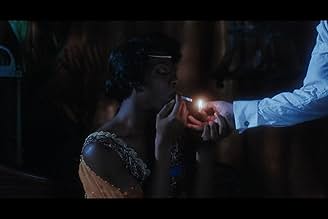IMDb रेटिंग
7.4/10
3 हज़ार
आपकी रेटिंग
अपनी भाषा में प्लॉट जोड़ेंWhen a bishop comes to a prison to hear the confession of an old friend he is forced to watch a play, performed by the inmates, about their youth together, love and betrayal.When a bishop comes to a prison to hear the confession of an old friend he is forced to watch a play, performed by the inmates, about their youth together, love and betrayal.When a bishop comes to a prison to hear the confession of an old friend he is forced to watch a play, performed by the inmates, about their youth together, love and betrayal.
- पुरस्कार
- 8 जीत और कुल 14 नामांकन
Benoît Lagrandeur
- Prison Ensemble
- (as Benoit Lagrandeur)
Pierre Leblanc
- Prison Ensemble
- (as Pierre LeBlanc)
Jean Lévesque
- Prison Ensemble
- (as Jean Levesque)
फ़ीचर्ड समीक्षाएं
"Lilies" is an achingly beautiful work. The acting, cinematography, music and sets are stunning. The use of only male actors, including for female characters, seems right here. And in the final analysis, the best and worst of human emotion (especially concealed jealously) becomes so vividly portrayed that one is not sure whether to laugh, cry, or yell out with anger at the characters' actions. Anyone who considers themselves a "cinema buff" should put this one one their "must see" list. So, when does the DVD come out???
10Tesse
Everyone does things they would rather forget. Lilies is about one man's horrible sin returning to haunt him, 40 years after the fact. As a rash child, young Jean Bilodeau did all he could to seperate gay lovers Simon and Vallier- not for any high-minded moralistic reason, but out of his own jealousy and desire for Simon. 40 years later, Bilodeau and Simon meet again, and witness their history performed by prisoners in a Quebecois jail. What results is heartwrenching and beautiful.
The cinematography of Lilies is flawless, moving effortlessly between 1952 and 1912 with lush, vivid colours. The performances are also excellent, with Brent Carver a notable standout as Vallier's deluded mother (as the movie is a play set in a jail, we see the male prisoners perform all of the roles, including the female ones). Jason Cadieux and Danny Gilmore are beautiful as the young lovers going through the awkward pangs of adolesense, coming out, and first love. A truly beautiful movie for anyone who loves a good cinematic experience, I cannot recommend Lilies enough.
The cinematography of Lilies is flawless, moving effortlessly between 1952 and 1912 with lush, vivid colours. The performances are also excellent, with Brent Carver a notable standout as Vallier's deluded mother (as the movie is a play set in a jail, we see the male prisoners perform all of the roles, including the female ones). Jason Cadieux and Danny Gilmore are beautiful as the young lovers going through the awkward pangs of adolesense, coming out, and first love. A truly beautiful movie for anyone who loves a good cinematic experience, I cannot recommend Lilies enough.
I am writing mainly because the one comment I saw on this site was negative. I just watched the movie and it was gorgeous. Gorgeous scenery. Gorgeous men. Wonderful music. Jason Cadieux is gorgeous beyond words.
The movie is quite obviously set in a prison where there would be a lack of women. It is quite artistic. The use of men to play women is both campy, and artsy, hearkening back to Shakespeare. It is not done to get laughs however.
The twist in the movie is that the man who is to give his confession, hears a confession. It ends in a way that you must make up your mind about the punishment.
The movie is quite obviously set in a prison where there would be a lack of women. It is quite artistic. The use of men to play women is both campy, and artsy, hearkening back to Shakespeare. It is not done to get laughs however.
The twist in the movie is that the man who is to give his confession, hears a confession. It ends in a way that you must make up your mind about the punishment.
LILIES, based on a Canadian play 'Les feluettes' by Michel Marc Bouchard, has been adapted to the screen by Bouchard and placed in the sensitive hands of director John Greyson, an artist who is able to indulge in surrealism with reality and make it work well. This very beautiful film is cast entirely with men despite the fact that there are women roles in the story. How does he make that work successfully without pandering to artiness? View this little film and make the discovery for your self.
Set in Quebec in a prison, Bishop Bilodeau (Marcel Sabourin) has been summoned form the outside to hear the confession of 'a very sick man' who has been imprisoned for 40 years for a murder. Upon the Bishop's arrival the audience knows something is amiss: despite the atmosphere of the prison as a stage accompanied by choral singing of plainsong (The Hilliard Ensemble) there are props and images that seem out of place in a grim prison. The Bishop is ushered into the confessional booth and when he opens the window to hear confession, the person in the seat is Simon (Aubert Pallascio) the 'very sick' man who has planned for the bishop to watch a play depicting the 40 year old crime - a reverse on the confessional stance.Through a small aperture in the bishop's now locked confessional, the Bishop is forced to watch a reenactment of the incident 40 years ago when two young boys, Simon (Jason Cadieux) and Vallier (Danny Gilmore) were in love and the young future Bishop (Matthew Ferguson) was jealous of Vallier's attention from Simon and played a key role in 'murder' of Vallier that resulted in Simon's being accused and imprisoned. The atmosphere leading up to this act includes the reaction from the small town's homophobia and to Simon's sexual ambiguity that involves a strange lady Lydie-Anne (Alexander Chapman) who arrives form Paris via an air balloon. It is the interaction of the boys with the townsfolk, the new lady arrival who desires Simon's affections, and Vallier's understanding and self-sacrificing mother Countess De Tilly (Brent Carver) that leads to the fateful death of Simon. How the story ends in the confessional booth reversal is the beauty of the film that must be left unsaid for the drama to affect potential audiences of this movie.
The cast is all male because the whole story is a mise-en-scene, a play within a play, where all parts are acted by the prisoners for the sake of displaying truth to the Bishop. There is no pretense at making the men look like women except for the costumes and this enhances the message of the story. The actors are excellent and the impact of the story is powerful. Yes, this is a highly honored gay-themed film, but it is really more about the power of love both in youths and in thwarted adults that makes it a film for all audiences. Highly Recommended. Grady Harp
Set in Quebec in a prison, Bishop Bilodeau (Marcel Sabourin) has been summoned form the outside to hear the confession of 'a very sick man' who has been imprisoned for 40 years for a murder. Upon the Bishop's arrival the audience knows something is amiss: despite the atmosphere of the prison as a stage accompanied by choral singing of plainsong (The Hilliard Ensemble) there are props and images that seem out of place in a grim prison. The Bishop is ushered into the confessional booth and when he opens the window to hear confession, the person in the seat is Simon (Aubert Pallascio) the 'very sick' man who has planned for the bishop to watch a play depicting the 40 year old crime - a reverse on the confessional stance.Through a small aperture in the bishop's now locked confessional, the Bishop is forced to watch a reenactment of the incident 40 years ago when two young boys, Simon (Jason Cadieux) and Vallier (Danny Gilmore) were in love and the young future Bishop (Matthew Ferguson) was jealous of Vallier's attention from Simon and played a key role in 'murder' of Vallier that resulted in Simon's being accused and imprisoned. The atmosphere leading up to this act includes the reaction from the small town's homophobia and to Simon's sexual ambiguity that involves a strange lady Lydie-Anne (Alexander Chapman) who arrives form Paris via an air balloon. It is the interaction of the boys with the townsfolk, the new lady arrival who desires Simon's affections, and Vallier's understanding and self-sacrificing mother Countess De Tilly (Brent Carver) that leads to the fateful death of Simon. How the story ends in the confessional booth reversal is the beauty of the film that must be left unsaid for the drama to affect potential audiences of this movie.
The cast is all male because the whole story is a mise-en-scene, a play within a play, where all parts are acted by the prisoners for the sake of displaying truth to the Bishop. There is no pretense at making the men look like women except for the costumes and this enhances the message of the story. The actors are excellent and the impact of the story is powerful. Yes, this is a highly honored gay-themed film, but it is really more about the power of love both in youths and in thwarted adults that makes it a film for all audiences. Highly Recommended. Grady Harp
10bob-504
Luscious cinematography, soulful musical score, terrific casting, and limited use of revelatory flashbacks to dramatize the theme of societally-defined mores and criminal behavior. Artistic and judicious use of nudity and sexuality to illustrate the dilemmas of public versus private morality.
क्या आपको पता है
- भाव
Young Simon: [to Vallier] I shall be reborn. My breath in the heavens, bear witness. We shall be free. We'll we be loved. If you do truly love me, let your love be known unto me.
टॉप पसंद
रेटिंग देने के लिए साइन-इन करें और वैयक्तिकृत सुझावों के लिए वॉचलिस्ट करें
- How long is Lilies?Alexa द्वारा संचालित
विवरण
बॉक्स ऑफ़िस
- बजट
- CA$22,00,000(अनुमानित)
- US और कनाडा में सकल
- $3,01,548
- US और कनाडा में पहले सप्ताह में कुल कमाई
- $28,781
- 12 अक्टू॰ 1997
- दुनिया भर में सकल
- $3,01,548
इस पेज में योगदान दें
किसी बदलाव का सुझाव दें या अनुपलब्ध कॉन्टेंट जोड़ें
































